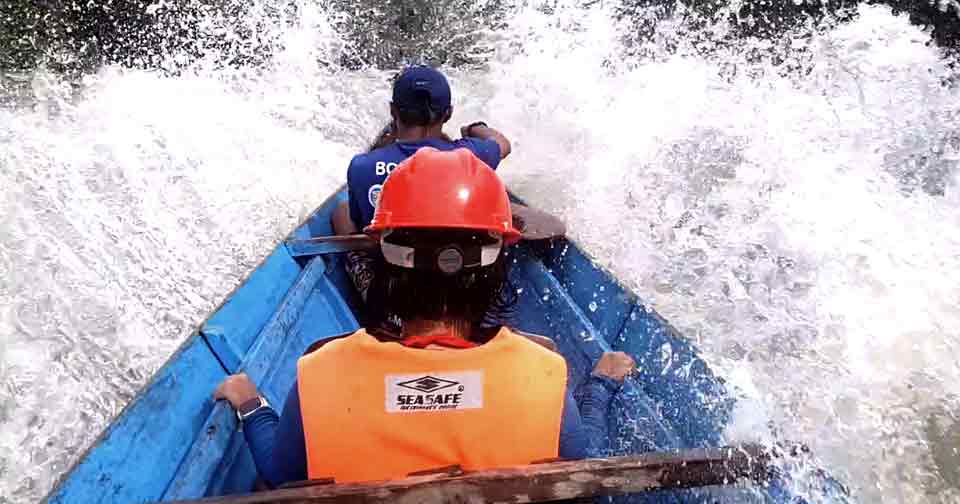
Letsgoph.com | We’re shooting through a wild, wild washing machine: paddling, cursing, laughing and getting absolutely drenched inside a torpedo-shaped canoe.
 We’re in the Ulot River, a 92-kilometer waterway which snakes east to west across Samar. The third largest island in the Philippines, Samar is rough country, hewn from limestone which over millennia formed some of the most dramatic rock formations and cave systems in the Philippines, such as the Langun-Gobingob Complex.
We’re in the Ulot River, a 92-kilometer waterway which snakes east to west across Samar. The third largest island in the Philippines, Samar is rough country, hewn from limestone which over millennia formed some of the most dramatic rock formations and cave systems in the Philippines, such as the Langun-Gobingob Complex.
Revenge Tourism is a social phenomenon where people who have been stuck at home, often for months at a time, rush to tourist sites to appease their lockdown fatigue. With easing lockdown and flight restrictions, more and more tourist destinations are experiencing waves of visitors out to re-experience paradise – but what about the people who guide them? The people who themselves work in paradise?
“I used to help cut and transport logs illegally,” reveals Epifanio ‘Panying’ Obidos, our boat guide. “For generations, we used traditional torpedo shaped canoes called balugo to transport timber. We would get orders to cut down hardwood trees like banuyo, narra or kamagong. One balugo can transport over 100 board feet of wood.”
Samar is among the poorest provinces in the country. In 2015, the Philippine Statistics Authority revealed that 45% or nearly half of all families in Samar lived below the poverty line. “The hardest part was that even when we’d risk run-ins with the law by transporting illegally-cut timber, we’d still have barely enough cash to survive. Often we’d borrow money from financiers to buy gas and other provisions to transport the logs they ordered. Even after getting paid, we’d still be in debt,” recalls Panying.
Things have steadily improved. Samar’s poverty incidence dropped to 30% by 2018, mostly because of small businesses, one of which is the Ulot River Torpedo Extreme Boat Adventure, where boats go bow-to-bow with raging rapids.
“In 2008, to veer away from illegal activities, we started using our torpedo-shaped balugo for tourism to showcase the natural beauty of Samar. We mostly employed locals who formerly worked as illegal loggers or log haulers,” explains Panying. “Back then we only had 12 people and a few old boats – but traversing rivers was a way of life for us, since we’ve been using it for transportation long before Samar’s road network was developed.”
Each torpedo boat has a three-man crew, comprised of a boat operator, tour guide and a point man, who sits at the bow or front of a boat, deftly using a paddle or pole to keep rocks at bay.
“Now our once-small operation has over 20 boats and employs 70 local people,” beams Panying. In 2018, their group, Tour Guides and Boat Operators for River Protection and Environmental Development Organization (TORPEDO), was recognized by the Department of Tourism for its responsible, community-based operations.
The Ulot River is part of the Samar Island Natural Park (SINP), the country’s largest land-based Protected
Area (PA). “The Philippines hosts 247 PAs and practically all of them give locals employment,” explains Department of Environment and Natural Resources Biodiversity Management Bureau (DENR-BMB) director Natividad Bernardino. The stories of many of these PAs are similar to Panying’s – of loggers turned into tour guides, hunters turned into rangers, blast fishers transformed into dive guides.
“For all this to continue, there must be a steady stream of clients,” notes SINP superintendent Eires Mate. “The COVID-19 lockdowns hit the world’s PAs hard, generating all-time visitor revenue lows. Many people were laid off and operations were drastically scaled-down. With our parks again open for business, we invite adventurers to visit the Ulot River and our country’s other beautiful PAs.”
Launched in May of 2022, the Year of the Protected Areas or YOPA aims not just to educate people on the need to conserve PAs, but to encourage them to visit the sites themselves. YOPA hopes to generate funds from tourists to ensure continued management for areas hard-hit by COVID-19 budget cuts.
Declaring natural sites as PAs is among the best ways to protect natural capital. “The jobs generated by sustainable and ethical tourism activities act as economic and social safety nets for locals who might otherwise turn to illegal means to support their families,” says United Nations Development Programme (UNDP) resident representative Selva Ramachandran.
* * *
Back in the Ulot River, the going is wet and wild. Our balugo, which traveled easily downstream, is now battling against the current in what locals jokingly call the ‘Salmon Run’ – akin to the epic upriver journeys undertaken by salmon in colder climes. Chilly geysers of water splash into the boat as our engines go full-throttle.
Just as soon as we’re sopping wet, the river calms down, the ride turning tranquil. Like the turbulent COVID-19 era, raging waters and rough times too, shall pass.
I glance ahead and notice what’s written on one of the guides’ shirts: #MAYFORRIVER, a play on #MayForever, the hope that some things really can endure the test of time.
With illegal activities, nothing is certain – but with legal, safe and sustainable tourism, then there truly might be forever.
“You know, if not for ecotourism, I would most probably be dead,” reflects Panying as we quietly glide back to shore. “The authorities would have definitely caught me, like they caught others. I might have starved to death, been shot by the cops or been hauled off to jail.”
He looks up, just a bit teary-eyed.
“In a very real way, ecotourism saved my life.”








